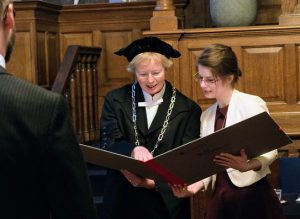Doctoral degree for Clémence Claussin
On March 22nd, Clémence Claussin successfully defended her thesis, which is entitled “Homologous recombination: a Swiss Army knife for protecting genome integrity.”
The genetic information required for life is stored within molecules of DNA. The complete set of DNA present in a cell is referred to as a genome. A cell goes to great lengths to ensure that any damage to its genome is properly repaired. Homologous recombination (HR) is a major pathway for repairing DNA damage, and it is best characterized for repairing DNA double-strand breaks (DSBs). A DSB is the most lethal form of DNA damage; one unrepaired DSB is sufficient to kill the cell.
Clémence’s work showed that HR is also important for repairing other types of DNA damage, both genome-wide and specifically at telomeres. For the former, she used a single-cell sequencing approach to measure and map a type of HR called sister chromatid exchange (SCE). Surprisingly, she found that the majority of SCE events that occur in normal, unperturbed cells is not due to the repair of DSBs. At telomeres, she discovered that multiple HR subpathways are involved in repairing damage induced by telomere shortening. Taken together, her work highlights the utility of HR to fix a variety of problems associated with safeguarding genome integrity.
Defects in the HR machinery can lead to genome instability and telomere dysfunction, which are hallmarks of both cancer and ageing. Thus, figuring out what types of DNA damage HR repairs, and how that repair occurs, may help us combat cancer and ageing.
Congratulations, Clémence! Good luck in the next phase of your academic career!
Back to previous page






